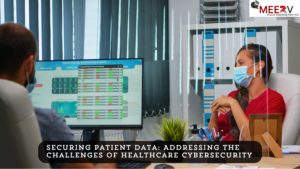Cybersecurity – What You Need to Know to Protect Your Business

Businesses are evolving rapidly due to advancements in technology. As your company grows, you’ll gain more customers and accumulate more data to manage. How you handle your IT systems can greatly impact your profits and reputation.
Data threats are a serious issue for businesses of all sizes. Cyber attacks are becoming more frequent, so it’s crucial to be prepared.
Cyber security is essential for protecting businesses from data threats and cyber attacks, which can affect companies of all sizes.
Investing in cyber security safeguards your data, maintains customer trust, and secures your company’s future.
What is Cyber Security ?
Cybersecurity is like a digital bodyguard that protects computers, devices, and networks from sneaky online threats.
Just like we lock our doors to keep intruders out, cybersecurity keeps the bad guys from breaking into our digital lives. It shields us from harmful viruses, sneaky hackers, and other cybercriminals who want to steal our personal information, money, or cause havoc.
Cybersecurity works by using special tools, software, and best practices to identify and block these threats before they can do any harm. It’s crucial in this digital age because we rely on computers and the internet for almost everything, from sending emails and shopping online to managing our bank accounts and storing precious memories.
By having strong cybersecurity measures in place, we can browse the web with peace of mind, knowing that our digital world is well-guarded.
Common Cyber Threats for Business
Businesses face a wide range of cyber threats, and the impact of these threats can be severe.
Ransomware: Malicious software that encrypts a company’s data and demands a ransom for its release. This can lead to data loss, operational disruption, and financial losses.
Phishing and Business Email Compromise (BEC): Cybercriminals target employees through deceptive emails, trying to trick them into revealing sensitive information or making fraudulent transactions.
Data Breaches: Unauthorized access or theft of sensitive customer information or intellectual property can harm a company’s reputation and lead to legal and financial consequences.
Insider Threats: Employees or former employees with access to company systems may intentionally or accidentally cause security breaches, data leaks, or other damages.
Distributed Denial of Service (DDoS) Attacks: Cyber attackers flood a company’s network or website with traffic, causing it to become slow or unavailable to customers.
Advanced Persistent Threats (APTs): Sophisticated and targeted attacks, often conducted by well-funded and persistent adversaries, with the intention of compromising a specific organization for a long time.
Malware and Viruses: These malicious programs can infect the company’s systems, leading to data loss, system disruption, or unauthorized access.
Supply Chain Attacks: Cybercriminals target vulnerabilities in a business’s supply chain to gain access to their systems and data.
Credential Attacks: Cyber attackers use stolen or weak credentials to gain unauthorized access to corporate accounts, systems, or cloud services.
IoT Vulnerabilities: Internet of Things devices connected to the business network can be exploited to gain unauthorized access or launch attacks.
Social Engineering Attacks: Manipulating employees through psychological tactics to trick them into revealing sensitive information or performing actions that compromise security.
Unpatched Software Vulnerabilities: Failure to apply timely security patches can leave systems exposed to known vulnerabilities that attackers can exploit.
What is the impact of cyberattacks on small businesses?
If you are a small business, you cannot afford cyber attacks. Statistics indicate that 60% of small businesses that suffer a cyber attack are often out of business within six months. You read that right: six months!
- Financial Losses: Cyberattacks can lead to financial losses due to data theft, ransom payments, or business disruptions. Recovering from an attack can be costly, especially if the business needs to invest in new security measures or pay for data recovery services.
- Damage to Reputation: A cyberattack can tarnish a small business’s reputation, leading to a loss of customer trust and loyalty. Negative publicity and the perception of inadequate security can drive customers away and harm the company’s brand image.
- Data Breaches: Cyberattacks may result in the theft or exposure of sensitive customer information, such as personal data or financial details. This can lead to legal liabilities, regulatory fines, and loss of customer confidence.
- Operational Disruptions: A successful cyberattack can disrupt business operations, causing downtime, system failures, or loss of productivity. This disruption can result in missed opportunities, delayed projects, and dissatisfied customers.
- Intellectual Property Theft: Small businesses often have valuable intellectual property, trade secrets, or proprietary information. A cyberattack can lead to the theft of these assets, impacting the company’s competitive advantage.
- Legal and Compliance Issues: Small businesses may face legal challenges and non-compliance penalties if they fail to protect customer data adequately. Compliance with data protection regulations becomes crucial in the aftermath of a cyber incident.
- Employee Morale: A cyberattack can also affect employee morale and productivity. Employees may feel stressed and demotivated when dealing with the aftermath of an attack, affecting the overall work environment.
- Supply Chain Disruptions: A cyberattack on a small business can also impact its suppliers and partners, leading to supply chain disruptions and potential financial losses for all parties involved.
Cyber Security Tips for Small Business
With mounting cyber threats, companies must ensure they are not caught napping. Here are things you can do now to ensure cyber attacks do not cripple your business.
Educate Employees
Educating employees about cybersecurity is a critical aspect of protecting a small business from cyber threats. Employees are often the first line of defense against cyber-attacks, and their knowledge and awareness can make a significant difference.
Through comprehensive cybersecurity training, employees learn about the latest threats, such as phishing emails, malware, and social engineering techniques, and how to spot them. They also receive guidance on creating strong passwords, practicing safe web browsing, and securely handling sensitive data.
By understanding the importance of cybersecurity and the potential consequences of cyber incidents, employees become more vigilant and proactive in safeguarding company assets and customer information.
Regular training sessions and updates help reinforce these practices, ensuring that cybersecurity remains a top priority within the organization.
With an informed and cybersecurity-aware workforce, small businesses can build a strong defense against cyber threats, minimizing the risk of breaches and protecting their reputation and bottom line.
Keep Software and Systems Updated
Keeping software and systems updated is a fundamental cybersecurity measure that small businesses must prioritize to maintain a secure digital environment.
Software updates, also known as patches or security updates, are released by vendors to address known vulnerabilities and weaknesses in their products. These vulnerabilities can be exploited by cybercriminals to gain unauthorized access, steal sensitive data, or cause disruptions.
By regularly applying updates to operating systems, applications, and security software, businesses ensure that they have the latest protections against emerging threats. Neglecting updates can leave systems exposed to known exploits, making them easy targets for hackers.
Additionally, updates often include new features and performance improvements, contributing to overall system reliability and efficiency. Automated update mechanisms can streamline the process and reduce the risk of oversight.
Emphasizing the importance of updates within the organization and creating a clear update policy will encourage employees to promptly implement these crucial security measures.
Ultimately, a proactive approach to software and system updates helps safeguard small businesses against cyber-attacks, bolstering their resilience and safeguarding their digital assets and customer trust.
Use Strong Passwords and Multi-factor Authentication (MFA)
Using strong passwords and multi-factor authentication (MFA) is a important way to enhance the security in today’s digital landscape. A strong password is complex, incorporating a mix of upper and lower-case letters, numbers, and special characters, making it harder for cybercriminals to guess or crack.
Encouraging employees to create and regularly update strong passwords for their accounts helps thwart brute-force attacks and unauthorized access attempts.
However, relying solely on passwords can still leave vulnerabilities. This is where multi-factor authentication comes into play.
MFA adds an extra layer of security by requiring users to provide additional verification, such as a one-time code sent to their phone or biometric data like a fingerprint or facial recognition. This way, even if a password is compromised, the attacker would still need the second factor to gain access.
Implementing MFA significantly reduces the risk of unauthorized access to critical systems and sensitive data.
Make Cybersecurity a Priority
There are companies that treat cybersecurity as a dispensable expense. However, without proper cybersecurity, a company is susceptible to all kinds of attacks.
So make cybersecurity a priority in your company. This should reflect on the funds committed to your IT infrastructure and IT architecture. It should also reflect on the caliber of people you hire to man your IT infrastructure as well as your company’s IT strategy.
Your company’s IT strategy should also clearly outline the plans and strategies that would ensure your cybersecurity is not compromised.
Secure Your Network
Securing your network is like putting a strong lock on the doors of your business’s digital world. Just as you protect your physical office with security measures, you need to guard your computer network from cyber threats.
A secure network uses special tools and settings to block sneaky hackers and harmful software from getting inside. It includes things like firewalls that act as digital barriers, keeping the bad guys out while allowing safe traffic in.
Encryption is also used to scramble your data, making it unreadable to anyone trying to intercept it.
When your network is secure, you can work and browse the internet with confidence, knowing that your business information and customer data are well-protected.
It’s like having a virtual security guard always on duty, keeping your digital space safe from troublemakers.
Conduct Intermittent Cybersecurity Training
The story is all-too-common: a company’s employee receives an email link and gleefully clicks unaware that it was a malware-infected link. With that one click, the company’s software, customer’s data etc. are all affected.
From there it’s a lost cause. It becomes a maze of losing reputation with customers, ransoms and blackmails, expensive cybersecurity consultation until the company finally folds up. Your employees are more susceptible than you think. That is why cybersecurity should not be the focus of IT technicians alone. The awareness of cybersecurity threats should be drummed home into the mind of every employee. This can be done through consistent training and retraining of personnel.
Today’s employees are almost always on the internet, working with data, opening emails, moving from one site to another and constantly communicating with co-workers and clients, and without appropriate training, it is possible to have debacles.
Limit Access to Data
Limiting access to data is like having different levels of locks on the doors of your business.
Just as you don’t give everyone access to all the rooms in your office, you should control who can see and use sensitive information in your digital world.
By doing this, you can make sure that only the right people with proper authorization can access important data.
For example, only certain employees who need specific information for their work should be allowed to see it. This way, even if there’s a security breach or a mistake, the damage is limited because not everyone has access to everything. It’s like keeping your valuable possessions in a safe, with only a few trusted people having the key.
By limiting data access, you add an extra layer of protection to your business and ensure that confidential information stays safe and secure.
Secure Mobile/computer Devices
Securing your mobile and computer devices is like creating a fortress to protect your digital business world. Just as you lock your house to keep it safe, you need to secure your devices to keep cyber threats at bay.
Start by using strong passwords, patterns, or biometrics (like your fingerprint) to lock your phone or computer.
This way, only you can access them. Keep your software, apps, and antivirus programs up to date as these updates fix any weak spots that hackers might try to sneak through.
Be careful with apps and only download them from official app stores to avoid malicious ones. Avoid clicking on suspicious links or downloading files from unknown sources as they can hide dangerous malware. Also, consider enabling encryption to safeguard your sensitive data from prying eyes.
Lastly, if you lose your device, have a remote wipe option set up so you can erase your data from afar.
Protect Against Malware/Virus
Protecting against malware and viruses is like putting on armor to shield your digital world from dangerous invaders.
Malware and viruses are like tiny troublemakers that can sneak into your computer, phone, or tablet and cause havoc.
To keep them out, you need strong defenses. First, install reliable antivirus software on your device. It acts like a vigilant guard, scanning and removing any harmful software it finds.
Keep your software and apps updated, just like you get the latest superhero gadgets to stay prepared.
Be cautious with emails and avoid clicking on suspicious links or downloading files from unknown sources. Stick to trusted app stores and websites when downloading software or apps, as some places can be risky.
Create an Incident Response Plan
Creating an Incident Response Plan is like having a superhero team ready to act when trouble strikes in your business.
Just as heroes have a plan to handle emergencies, this plan prepares your business for cyber incidents like data breaches or malware attacks. It outlines step-by-step actions to follow, like who to contact, how to contain the threat, and how to minimize damage. It’s like a blueprint to keep everyone focused and organized during a crisis.
The plan designates specific roles to team members, so everyone knows what to do.
Once the situation is under control, it guides the investigation to understand what happened and how to prevent it in the future.
Secure Physical Access
Securing physical access is like having a strong lock on the front door of your business.
Just as you want to keep intruders out of your office or store, securing physical access means protecting the places where your computers, servers, and important data are stored.
You can do this by limiting who can enter these areas and using security measures like access cards or biometric scanners. It’s like having a secret code or your fingerprint to unlock the door, making sure only authorized people can get in.
By controlling who has access to your digital equipment and sensitive information, you create a barrier against potential threats.
It’s an important part of your overall security strategy, ensuring that your valuable assets and data stay safe and sound, like a fortress protecting your business from harm.
Engage Industry Experts
Working with people who have been in the industry, who have gleaned valuable experience and are abreast with the current trends is a safe bet. Such experts have a broad array of expertise and strength in areas ranging from banking to retail.
In looking for agencies that can help you, be sure to examine their track record, their area of expertise and strength, availability as well as their experience in the area you intend to operate in.
Related : 15 Online Free Tools to Scan Website Security Vulnerabilities & Malware
Wrapping Up
No company should be caught dragging their heels when it comes to committing resource to ensuring cybersecurity. In an age where a slew of cybersecurity attacks can cripple a company, nothing should be left to chance.
Ensure that in your company culture and ethos, cybersecurity is upheld. Also, constant training of employees can ensure safety. But in all that you do, don’t forget to call on industry experts who can help you secure your company from cyber attacks.






